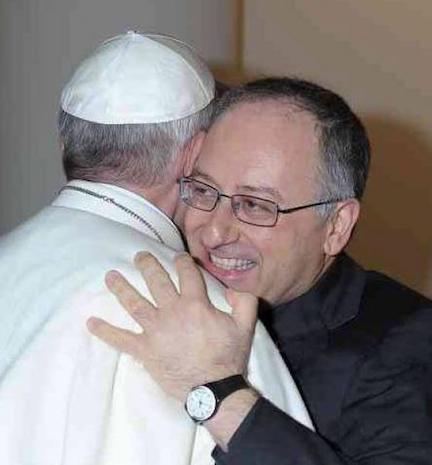A newly published interview with Pope Francis by Fr. Antonio Spadaro, S.J. has caused much anguish and bewilderment among a group of Catholics who are already disfavored and even rejected by some Churchmen – those who prefer to attend the Tridentine Latin Mass, now known as the Extraordinary Form (EF) of the Roman Rite.
Pope Francis told Fr. Spadaro:
Pope Benedict accomplished a just and magnanimous gesture to reach out to a certain mindset of some groups and persons who felt nostalgia and were distancing themselves. But it is an exception. That is why one speaks of an “extraordinary” rite. The ordinary in the Church is not this. It is necessary to approach with magnanimity those attached to a certain form of prayer. But the ordinary is not this. Vatican II and Sacrosanctum Concilium must go on as they are. To speak of a “reform of the reform” is an error.
A few observations: to speak of a “mindset” is to stigmatize those who see and love the value of the Church’s traditional worship as trapped in an unreflective, fixed way of thinking. We teach children the importance of working hard in school to acquire knowledge, habits of independent thought and inquiry and good criteria of judgment. We do not tell them to study hard to acquire a mindset, which may be described as an unnecessarily constricted or just plain erroneous way of thinking.
Living one’s life according to a mindset means one has fallen short of a fuller understanding. Mindsets are obstacles, not vehicles, to a proper appreciation of truth, beauty, and goodness. Sticking to a mindset is often the result of a positive refusal to see the broader reality for fear of what one might discover. Pity, not praise, is in order when dealing with people who have a mindset.
Pope Francis also spoke about “persons who felt nostalgia” for the EF Mass. What is nostalgia? I take it to mean a sentimental and essentially unreasonable attachment to the past. It can be a harmless reminiscence (“When the Dodgers played at Ebbets Field in Brooklyn . . .”), but when it involves trying to reproduce now what happened in the past, it can be a psychologically destructive impulse.

Is nostalgia the motivating impulse of those older Catholics who like to attend the EF Mass? Certainly not, if my experience is not dissimilar to that of other priests who offer the EF Mass when called upon by the faithful. These Catholics, both young and old, are seeking not to live in the past, but to experience the holiness of the living Christ through His Church’s time-honored worship.
Mindset and nostalgia are loaded words that transfer discussion from the realm of intellectual inquiry to the realm of psychological analysis. The question is not “What do these Catholics find attractive and inspiring in the EF Mass?,” but rather “What went wrong in the lives of these Catholics who are attached to the EF and do not find the Ordinary Form sufficient?”
Fr. Spadaro continued and asked Pope Francis: “Other than those who are sincere and ask for this possibility out of habit or devotion, can this desire express something else? Are there dangers?”
Pope Francis replied:
I ask myself about this. For example, I always try to understand what is behind those individuals who are too young to have lived the pre-Conciliar liturgy, and who want it nonetheless. I have at times found myself in front of people who are too rigid, an attitude of rigidity. And I ask myself: how come so much rigidity? You dig, you dig, this rigidity always hides something: insecurity, at times perhaps something else. . . .The rigidity is defensive. True love is not rigid.
This sweeping psychologizing indicates that the pope sees no reasonable motivations for those want to attend the EF Mass. The young cannot be nostalgic, since they did not grow up with the EF Mass. Rather, they have a “defensive” attitude of “rigidity” that hides their “insecurity” or “perhaps something else.” What does this mean?
Rigidity is a psychological impairment, an unreasonable refusal, if not a complete inability, to change one’s outlook or behavior. Francis says it is “always” a mask for insecurity or “at times perhaps something else,” which I take to mean something worse than mere insecurity.
In the last fifty years, “rigidity” has been a code word used to denigrate conservative Catholics who treasure the spiritual patrimony of the Church.
Earlier Pope Francis said: “It is necessary to approach with magnanimity those attached to a certain form of prayer.” Yet this spirit is absent from his remarks that characterize attachment to the EF.
This is really a caricature. It displays a readiness to find psychological deficits or imbalance as the cause for such interest among both young and old. This line of argument frees one from the need to engage in an objective analysis of the reasons why a young (or old) person might be attracted to the Church’s perennial form of worship instead of to the reformed Mass, as experienced in many parishes.
As regards Pope Francis’ statement that “to speak of a ‘reform of the reform’ is an error,” this notion is something that has been widely discussed and, in some ways, already put into effect (e.g., the 3rd edition of the Roman Missal and the new accurate translation of it into English) precisely because, as Pope Francis told Fr. Spadaro “Vatican II and Sacrosanctum Concilium must go on as they are.”
The reform of the reform is an effort both to implement the reforms of the Mass that the Conciliar Fathers voted for when they approved Sacrosanctum Concilium, and, as needed, to undo the innovations and accretions they never dreamed of, and that were introduced into the Roman Missal or became standard practice with the new Missal.
Those who love the EF Mass are serious, sane Catholics who seek God in the beauty of sublime worship. They deserve a sympathetic hearing from their shepherds.















